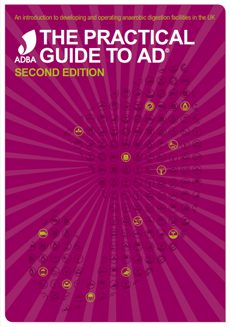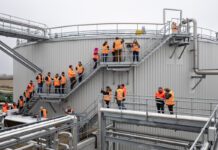
The Anaerobic Digestion & Bioresources Association (ADBA) has (on 3 October) released the second edition of The Practical Guide to AD, a key guidance document for developing and operating anaerobic digestion (AD) facilities in the UK.
The Guide covers key topics of relevance to AD operators, including feedstocks, producing and using biogas and biomethane, digestate, planning, regulation, funding and insurance, training, and health and safety.
Over 50 contributors, a team of reviewers, and external stakeholders fed in their expertise and knowledge to update the Guide with the latest regulatory, policy and technological developments in the AD sector.
AD plants recycle organic wastes and convert purpose-grown crops into renewable heat and power, low-carbon transport fuel, and nutrient-rich biofertiliser. AD plants in the UK currently have enough capacity to power over a million homes as well as producing a range of co-benefits such as reducing greenhouse gas emissions, supporting UK farmers, decarbonising large vehicles, and recovering resources from wastes.
The Guide will be a living document, updated online periodically in line with developments in the AD industry.
ADBA Chief Executive Charlotte Morton said of the publication of the second edition of the Practical Guide to AD:
“This is a vital industry guide produced by the AD industry for the AD industry that provides both new and existing developers all the information required to enable them to make sound technical, commercial and legal choices in relation to developing a new AD facility. Whether you have a basic understanding or in-depth technical knowledge of the AD industry, this handbook is designed as a hands-on guide to help you with every stage of your project.
“The Guide promotes good practice and ultimately aids in the delivery of successful AD projects, building on this mature, thriving industry that contributes so much in terms of decarbonisation, energy and food security, and restoring the UK’s soils. Importantly for an industry that has relevance all across the globe, the Guide is also transferrable to other potential AD developers outside of the UK.”
Les Gornall, Bioenergy Process Consultant at CAPITA PROjEN, said:
“The first edition of the ADBA Practical Guide to AD contributed to building an industry in the UK with the scale of a nuclear power station. Educating and training 500 expert biogas plant operators has not been easy, but the Practical Guide was their textbook. There has been much development in the industry in legislation, health and safety, planning permission, feedstock and optimisation as well as the focus changing from electricity production at 40% efficiency to gas-to-grid at over 90% efficiency.
“This second edition is timely and will become as important as its predecessor. It is essential reading for developers, operators and supporters of an industry that is focussed on converting waste into energy and organic fertiliser and making a significant local and international contribution to the removal of greenhouse gases and global warming.”
Dan Purvis, Head of Operations at AD operators Future Biogas, said:
“It is in the whole industry’s interest for us to put on a united front and demonstrate to our key stakeholders such as communities surrounding our plants, government, the Environment Agency and the Health & Safety Executive that we are a knowledgeable, competent and trustworthy partner in our journey to the greater use of green energy.
“The Practical Guide allows the sharing of learning to be made available not just to new entrants to the industry but also to existing members. We should never stop improving if we are to see this industry continue to grow and realise the great potential of AD.”
Dr Robin Szmidt, Director at Target Renewables, said:
“I’m really pleased to see the Practical Guide updated. It’s a tremendous introduction to AD, including what you can and can’t expect from the technology. It’s essential reading for new entrants to the industry as well as an ongoing reference for those already in business. It’s also perhaps the only such guide applying to AD with an international flavour worldwide.”
Ron McIlwraith, Engineering Director at AD operator Agrivert, said:
“The Practical Guide is essential reading for everyone with an interest in AD. It is as valuable an introduction to students as it is a reference point for those who have many years’ experience in the industry. The collective learning from all facets of the AD industry has been compiled to assist continuous improvement in design, operation, maintenance, compliance, and health and safety.”
Terence Brownhill, Energy & Waste Consultant at Stopford Energy & Environment, said:
“The Practical Guide is a unique document developed by ADBA to provide all stakeholders involved in the development or operation of AD facilities with sufficient information or signposting to enable them to make sound business case decisions.”
Dr Stephen Wise, Waste Sector Director at Amec Foster Wheeler, said:
“The Practical Guide to AD has been written and reviewed by some of the leading experts within the sector and provides a concise and key source of information and help. It shows that we do have a wealth of expertise within the sector that can help improve it for all.”
AD consultant David Woolgar said:
“The updated edition of the Practical Guide to AD is a valuable resource for operators and designers as it now incorporates the experience that the industry has accumulated over the past few busy years of AD development.”
ADBA members can download the Guide for free and non-members can purchase the Guide here.







